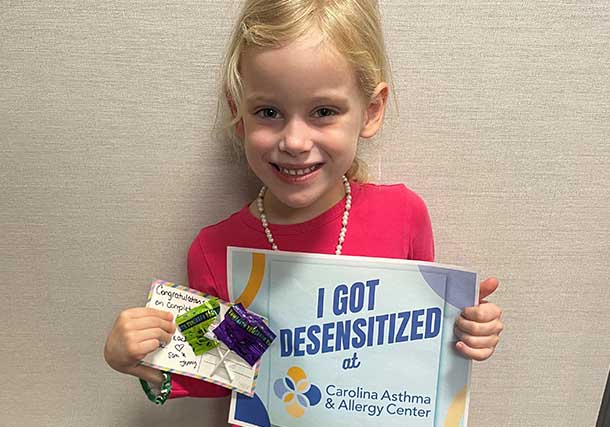
Food Allergy Testing in Charlotte
At Carolina Asthma & Allergy Center, we offer various types of food allergy testing around Charlotte to determine what’s causing your allergic reactions. Our team of Board-Certified allergists is here to give you the best care possible, and help you return to a sense of normalcy. Whether you’re having significant reactions or frustrating sensitivities, we’re here to help. We will guide you through the testing process, explain the results, and work with you to develop a personalized management plan that is both effective and convenient.
Jump Ahead:
At Carolina Asthma and Allergy Center, we provide comprehensive evaluation and treatment for allergies, including all types of food allergy testing. If you suspect you may have a food allergy or have experienced symptoms after exposure to certain foods, our team of board-certified allergists and experienced healthcare professionals can help.
To schedule an appointment, you can call our office or fill out the online appointment request form on our website. Our friendly staff will work with you to find a convenient date and time for your visit.
Please note: Because there is a substantial waiting list for food challenges, please take care in scheduling food challenge appointments and inform the office as soon as possible if you need to reschedule.
During your appointment, our allergists will carefully review your medical history, perform a thorough physical examination, and conduct relevant tests to determine the presence of an allergy. These tests may include a skin test, blood test, or food challenge.
Based on the evaluation results, our team will develop a personalized treatment plan to effectively manage your food allergy symptoms and prevent future allergic reactions. Our goal is to provide you with the highest quality care and support in addressing your allergies, helping you lead a healthier and more comfortable life.
What is Food Allergy Testing?
Food allergy testing is a medical evaluation designed to identify specific foods that trigger allergic reactions in your body. There are multiple different types of tests that an allergist may recommend, ranging from simple skin and blood tests to comprehensive food challenges. The type of testing recommended depends on your symptoms, medical history, and the suspected allergens.
Our testing methods include skin tests, blood tests, and oral food challenges (also called feeding tests). Food challenges are considered the “gold standard” of food allergy testing and provide the most definitive results.

How Does Food Allergy Testing Work?
Food allergy testing is a process that helps identify the specific triggers causing your allergic reactions. Simply put, allergies occur when the immune system overreacts to certain substances, like peanuts or shellfish. To determine the most effective treatment approach, our team will work closely with you to pinpoint the exact cause of your allergic reactions.
The testing process typically begins with simpler tests like skin or blood testing. If these tests are inconclusive or present conflicting results, we may recommend a supervised food challenge for the most accurate diagnosis.
During food allergy testing, we carefully observe your body’s reaction to suspected allergens under medical supervision. Through this process, our doctors can determine which foods are responsible for triggering your allergic reactions. With this information, we collaborate with you to create a personalized management plan that will allow you to preserve your lifestyle while staying safe.
How Do You Know if You Need a Food Allergy Test?
If you experience recurring or persistent symptoms that could be caused by certain foods, it may be beneficial to undergo a food allergy test. People of all ages can benefit from food allergy testing.
Here are some reasons that you may choose to schedule a food allergy test:
- History of Food Allergies: If you have a known history of food allergies, either personal or in your family, and you suspect that you are being exposed to allergens, a food allergy test can provide confirmation and help determine the best course of action for managing your allergies.
- Unexplained Reactions: If you have experienced unexplained reactions, such as difficulty breathing, swelling, or hives, after exposure to certain foods, a food allergy test can help identify the culprit and guide preventive measures.
- Checking On Your Children: Food allergy testing for kids is especially important to learn if your child has food allergies that could be severe or life-threatening. Food challenges can be extremely useful for young children who have symptoms of an allergy (such as rhinitis, hives or flushing) at a young age but don’t know the trigger.
- Outgrowing Allergies: After some time has passed, a lack of reaction to certain foods may prompt you to take a food allergy test. Many adults and older children schedule follow-up food allergy tests to see if they’ve outgrown their allergies.
If you are unsure whether you need an allergy test, it is recommended that you consult with a healthcare professional, such as a board-certified allergist or an immunologist. By identifying your specific allergens, you can develop a personalized management plan to reduce your exposure to certain ingredients and effectively manage your food allergies.
What are the Different Types of Food Allergy Testing?
At Carolina Asthma and Allergy Center, we offer three primary types of food allergy tests to help identify the specific foods that trigger your allergic reactions. Our experienced team of healthcare professionals and board-certified allergists will administer each of these tests in a controlled setting with a high level of supervision to ensure the patient has access to emergency help if needed.
Skin Testing
In this test, the skin is lightly pricked with a solution of the food to introduce the allergen to the person’s system. An allergist can test one or multiple foods during this test. This process allows the allergist to see the body’s immunoglobulin E (IgE) reaction to certain food triggers. Results should appear within 10 minutes and will be analyzed by the allergist to determine a food allergy.
Blood Testing
After a blood sample is extracted from the patient, it is sent to a lab where the IgE antibody levels are tested. The results are typically ready within a week, and an allergist can determine if they indicate whether an allergen is present.
Food Challenge Testing
A food challenge, also known as an oral food challenge (OFC) or feeding test, is considered the most accurate and definitive method for diagnosing food allergies. You can receive a food challenge test as a child or adult, and only one food can be tested at a time.
How Food Challenges Work
During a food challenge test, a patient will be gradually introduced to a specific food in increasingly larger amounts to test their tolerance. As more and more of the food is introduced to your system, the allergist will monitor to see if a patient reacts. If symptoms of a reaction start, treatment will begin immediately and the food challenge will stop.
Since this test has the potential to cause a serious allergic reaction or life-threatening anaphylaxis, the test should only be done under medical supervision. During the test, the patient is closely monitored for any negative reaction to the food in a controlled clinical environment.
When Food Challenges Are Recommended
Food challenges are particularly useful when:
- Skin or blood tests are inconclusive or present false positives
- You want to determine if you’ve outgrown a known food allergy
- There’s uncertainty about whether symptoms are truly caused by a specific food
- A definitive diagnosis is needed for treatment planning
Each type of food allergy test has its advantages and disadvantages, and the choice of testing method will depend on your individual circumstances. The selection of the appropriate allergy test will depend on your medical history, symptoms, and suspected allergens. Our team will guide you through the testing process and ensure that you receive accurate and reliable results.
What to Expect: Preparing for Your Food Allergy Test
General Preparation (All Tests)
When scheduling your food allergy test, ask your allergist if there is anything you should do to prepare for the test. On most occasions, they will ask that you do not take any antihistamines (allergy medications) around three to five days prior to your appointment.
Specific Food Challenge Preparation
Food challenges require additional preparation due to their comprehensive nature and the 3-6 hour duration of the test.
Before Your Food Challenge
- Health Requirement: The patient must be in 100% good health on the day of the test
- Fasting: Avoid eating anything for at least 4 hours leading up to the appointment, except for small children who may have a light meal 2 hours before
- Medication Guidelines: Stop all antihistamines five days before the challenge. Continue all asthma steroid preventative inhalers and nasal steroid sprays. Avoid using an inhaler with salmeterol or formoterol in it 8 hours before the challenge. Avoid using a rescue inhaler (albuterol, xopenex) preventively 8 hours before the challenge.
Important: Never avoid treating allergy or asthma with rescue medications because a food challenge is approaching. If you need to use a rescue inhaler, an antihistamine, or even epinephrine, please use the medicine and call the office to discuss whether the challenge should be postponed.
What to Bring to Your Food Challenge
- At least 2 different servings of the food to be challenged, or other specifications as directed by our team
- Your epinephrine autoinjector twin pack
- Something to entertain yourself/your child during the visit (coloring books, electronic devices, games)
- For picky eaters: Several forms of the food (eg, cow’s milk and cow’s milk yogurt)
- Anything that may make it easier for your child to eat a new food (favorite plates, cups, spoons, prizes, etc)
Preparing Your Child for a Food Challenge
- Explain the procedure without overwhelming them
- Tell your child that they will have a test to see whether they’re allergic to the food
- Explain that the food will be eaten at the doctor’s office with doctors and nurses present to keep them safe
- Emphasize that they can bring games and fun activities
- Bring comfort items to help with the experience
After Your Test
If you do not experience symptoms during a food challenge, you can expect to be monitored for one hour. If you have a reaction during the test, it will be treated promptly according to severity. Mild reactions may be treated with antihistamines, while more severe reactions would require an epinephrine auto-injector and extended observation, or possibly transfer to an emergency room.
Since it’s sometimes difficult to diagnose food allergies, and initial skin or blood tests may present incorrect results, secondary tests may be recommended.
Food Challenge Recipes
For patients undergoing baked milk or baked egg challenges, we provide specific recipes to ensure consistent testing:
Summary
At Carolina Asthma & Allergy Center, we’re here to help you gain valuable insights into your food allergies and take proactive steps towards managing them effectively. From simple skin tests to comprehensive food challenges, we offer the full spectrum of testing options to provide you with accurate diagnoses and personalized treatment plans.
Contact one of our Charlotte area locations today to schedule your food allergy testing appointment and embark on your journey to better health.
Food Allergy Testing FAQs
What can I expect before and after food allergy testing?
When scheduling your food allergy test, ask your allergist if there is anything you should do to prepare for the test. On most occasions, they will ask that you do not take any antihistamines (allergy medications) around three to five days prior to your appointment.
Since it's difficult to diagnose food allergies, and an initial skin or blood test may present incorrect results, secondary tests may be recommended.
Are there any side effects to food allergy testing?
Skin and blood tests typically have minimal side effects. However, since a food challenge is conducted to test an allergy, a patient may experience flushing, itching, hives, or other signs of an allergic reaction. While most allergic reactions are mild, a severe reaction may occur. This is why food challenges are only conducted under strict medical supervision with emergency treatment immediately available.
How long do different tests take?
- Skin tests: Results appear within 10 minutes
- Blood tests: Results are typically ready within a week
- Food challenges: Take approximately 3-6 hours, plus an additional hour of monitoring if no reaction occurs
Can children have food allergy testing?
Yes, people of all ages can benefit from food allergy testing. Food challenge testing is particularly valuable for children to identify allergies early and determine if they've outgrown previous allergies as they develop.

Try our new Allergy-Friendly Restaurant Guide
A curated list of Charlotte area restaurants with allergy-friendly menus, making it easier for individuals with food allergies to enjoy dining experiences without worry
